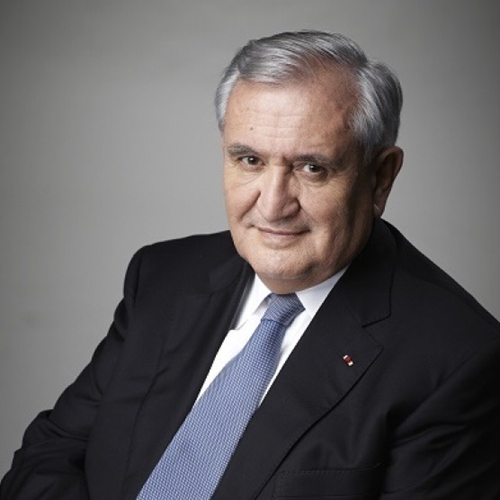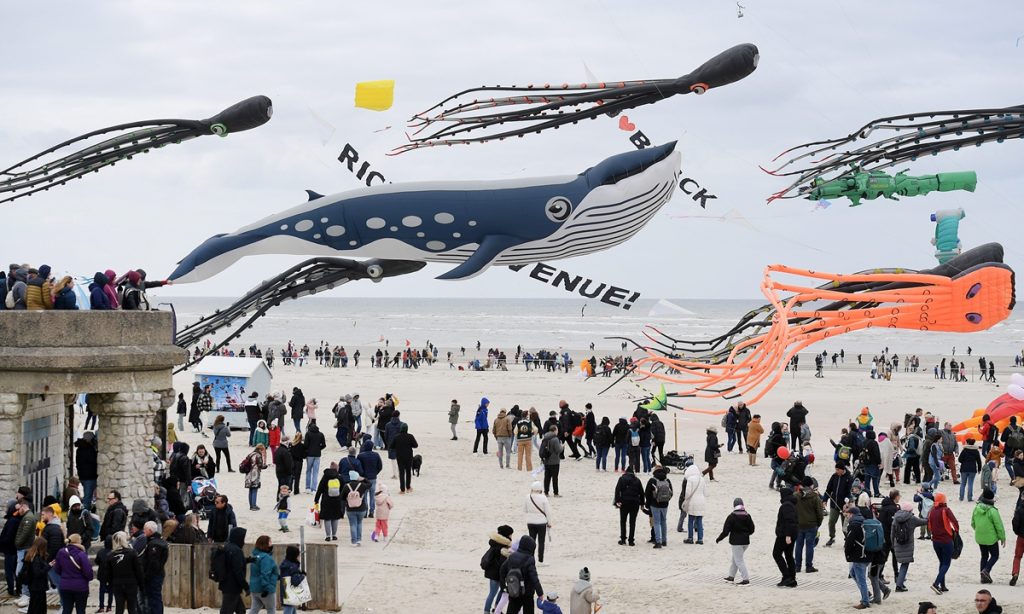Xi arrives in Belgrade for state visit to Serbia
Chinese President Xi Jinping on Tuesday arrived in Belgrade to pay a state visit to Serbia.
Chinese President Xi Jinping on Tuesday arrived in Belgrade to pay a state visit to Serbia.

Editor's Note:
Chinese President Xi Jinping left Beijing on Sunday morning for state visits to France, Serbia and Hungary at the invitation of President Emmanuel Macron of the Republic of France, President Aleksandar Vucic of the Republic of Serbia, and President Tamás Sulyok and Prime Minister Viktor Orbán of Hungary. Ahead of his visit to France, Global Times reporters Chen Qingqing and Bai Yunyi (GT) interviewed former French prime minister Jean-Pierre Raffarin (Raffarin), talking about the significance of the state visit for China-France relations, reviewing the future development of bilateral ties, and discussing the role of China-France relations in China-EU relations.
GT: This year marks the 60th anniversary of diplomatic relations between China and France. Could you share some important historical moments and achievements from these 60 years of China-France relations?
Raffarin: First of all, General de Gaulle's decision to establish diplomatic relations with China in 1964 is itself historic. France's support for the Chinese authorities in their fight against the SARS pandemic in 2003 was a major act, as were the opening of the Airbus factory in North China's Tianjin and the commissioning of the first Franco-Chinese nuclear reactor in South China's Guangdong Province. I am also very struck by the beauty of the Beijing Opera House designed by French architect Paul Andreu. There have been many joint creations across numerous fields. In 60 years, I have made more than 100 trips to China; 100 opportunities for very fruitful sharing.
GT: Over the last 60 years, what have been the changes and constants in China-France relations?
Raffarin: The constant is France's desire for independence in its policy with China. The change has been the development of the European Union, which has made diplomatic work more complex. All French presidents have followed, in relation to China, Charles de Gaulle's major orientations: Respect for civilizations, frank discussions, and co-responsibility for the future.
GT: In your opinion, what is the core element that has allowed these relations to withstand tests and continue to progress?
Raffarin: The central core is the mutual cultural appetite.
Analyzing the differences in our two civilizations is particularly fruitful as demonstrated by the philosopher François Jullien.
Culture is the heart of our relationship. The joint curiosity has been intact for centuries. This is the source of the respect that allows us to live with deep differences.
GT: How do you assess the current relations between China and France? Given the challenges of globalization and changes in the international political and economic situation, in which areas can China and France strengthen cooperation?
Raffarin: France has stable relations with China unlike many other countries, including in Europe. Chinese President Xi Jinping and French President Emmanuel Macron are two leading figures who know each other very well. They have spent hours and hours in discussion together.
The priority of our future relations, in my opinion, is building peace. In the short term, it is to act together for peace in Ukraine. In the medium term, it is to build a new multilateralism capable of allowing peace and development on our common planet.
GT: In your opinion, what role does China-France relations play within the framework of China-Europe relations? How will Europe's position in Chinese foreign policy evolve?
Raffarin: France's role in Europe is very active. We defend our ideas vigorously in all European forums. Our vision for Europe's strategic independence is gaining ground.
We are allies of the US, but do not want to be aligned with their interests. Donald Trump's place in the American debate convinced many European leaders that it is urgent to promote our sovereignty.
I think that the China-France dialogue is the best way to bring about peaceful solutions.
GT: 2024 is the year of China-France culture and tourism, as well as the Olympic year for France. Could you present the plans for cultural cooperation and exchanges between China and France for this year?
Raffarin: Many public and private initiatives will mark this year. For example, the exhibition on Versailles and the Forbidden City are particularly creative. A cultural forum bringing together Chinese and French artists will take place in November in Deauville. France will be the guest of honor at the Shanghai Expo. And more than 100 initiatives are already being programmed.
Cultural exchanges are the best medium for fostering mutual understanding and reciprocal respect.
GT: What role do cultural and human exchanges play in China-France relations?
Raffarin: We will prioritize student exchanges because they are the best vectors for promoting joint projects and creating deep and authentic ties between the two countries.
GT: In the fields of emerging technologies, sustainable development, and green energy, how can China and France seek new opportunities for cooperation?
Raffarin: I think we need to work together on the theme that is very popular among young Chinese and French people, which I call "the Planetization of politics."
Only recently has the Planet become a political object. There is a shared conviction among the world's youth: We must protect the Planet to protect Humanity.
Global governance needs consensus to progress. It is around this theme that it should be possible to invent a new multilateralism that will correct the current multilateralism's impotence.
GT: Given the current uncertainty of the international commercial environment, what are the challenges and opportunities facing China-France economic cooperation? How do you view 2023's debates in Europe on "de-risking" and this year's on "over capacity" in China?
Raffarin: We must understand our differences to avoid misunderstandings. There is a real consensus in Europe that public money should be used to help Europeans, for example, buy electric vehicles. But these subsidies are not intended to assist the production of foreign industries.
Since the WTO is currently partially blocked, trade regulation should proceed through bilateral agreements. The only real way to cooperate sustainably is to balance concessions.
GT: What are your expectations regarding the visit of the Chinese top leader to France?
Raffarin: Peace in Europe. Let's remain faithful to the spirit of General de Gaulle when, 60 years ago, he decided to establish diplomatic relations with China. The differences were probably greater than now, but the central idea was that our destinies are linked and thus the path of cooperation is more fruitful than confrontation. For this, direct and frank dialogue, understanding of each other's interests and values, and respect for sovereignty are necessary.
Chinese President Xi Jinping on Tuesday extended festive greetings and best wishes to the country's working people ahead of International Workers' Day, which falls on May 1.
Xi, also general secretary of the Communist Party of China (CPC) Central Committee and chairman of the Central Military Commission, sent the greetings on behalf of the CPC Central Committee.
This year marks the 75th anniversary of the founding of the People's Republic of China and a crucial year to fulfill the goals and tasks set in the 14th Five-Year Plan, Xi said, praising the important contributions made by the working people to the cause of the Party and the country.
Xi called on working people to actively participate in advancing Chinese modernization with high-quality development, and work tirelessly to promote the building of a strong country and the rejuvenation of the Chinese nation on all fronts.
Xi asked Party committees and governments at all levels to earnestly realize, safeguard and develop the legitimate rights and interests of workers, and encourage working people to realize dreams through their work.

China's cyberspace watchdog announced on Sunday the launch of a two-month nationwide campaign targeting illegal external links for online content including among group and social network circles and live streaming and video content with the help of artificial intelligence (AI) technology.
The campaign also targets pornographic and content displayed in commercial promotion areas of channels frequented by minors.
Illegal website links are published in user profile pictures, nicknames, bios, signatures, and covers. Methods such as posting explicit and low-quality content, frequent likes and follows, and account bio promotions are used for promotion and redirection among illegal accounts, the Cyberspace Administration of China (CAC) said in a post published on Sunday.
Illegal website links are also posted in comments under popular topics and live streams. Tactics such as "don't search this" or "ignore the text below" are used to induce users to search for illegal sites.
Links to pornographic and scam websites are shared within chat histories, H5 pages, document notes, and mini-program sharing links will be targeted. Fake group buying and game testing activities are used alongside hyperbolic language like "not forwarding makes you unpatriotic," to induce users to click on and spread illegal links.
New AI technology or false identities are used to post pseudo-success advice, "health courses," and financial tips, leading users to add friends or join groups for scams, the authority said.
Suggestive content is shared during live streams through placards, quick mobile screen switches, and censored photo displays, or illegal URLs are embedded in live announcements, program lists, and stickers.
Accounts on dating platforms post revealing photos to attract the opposite sex for illegal activities related to pornography and gambling will be a focus on officials. Vulgar comics and novels are pushed in browser pop-up ads, enticing users to click "read full text" or "continue listening," redirecting them to external illegal websites.
Illegal website links are artificially placed at the top of search results or generated as associated search terms to induce clicks, the CAC said.
Pornographic games are sold under the guise of "emotional single-player games," with customer service leading to third-party platforms for the sale of erotic novels. Services like "video live streaming promotion" or "fan base engagement" are offered to entice private inquiries, which actually provide services like inflating views, controlling reviews, or increasing followers.
The CAC said some pornographic novels and vulgar online literature are displayed in commercial promotion areas of channels frequented by minors.
Pornographic links are posted in apps used mainly by minors under the guise of free comics and video resources, leading them to illegal websites or to obtain pornographic material through cloud storage. These efforts aim to curb the spread of illegal content and protect the digital environment.

As spring breathes warmth into the air, kite festivals are being held worldwide, attracting thousands of kite enthusiasts and tourists alike. Flying kites, an ancient custom revitalized in modern society, is more than just an outdoor sport, but also a means of cultural preservation.
These festivals bring together top kite fliers from various nations, who showcase their unique designs and flying skills. The diversity ranges from China's traditional dragon kites to India's fighting kites, from simple paper versions to those made with modern high-tech materials.
Kites, invented by the ancient Chinese during the Spring and Autumn Period (770BC-476BC) over 2,000 years ago, has a rich heritage.
Legend has it that the philosopher Mozi crafted the first kite out of wood, a project that took three years to perfect. The inventor Lu Ban later improved on Mozi's designs using bamboo, and during the Eastern Han Dynasty (25-220), court official Cai Lun's improvements to papermaking technology led to the widespread use of paper in kite construction.
Right now, kite festivals not only highlight the diversity of the kites themselves, but also illustrate the cultural exchanges and integration they foster. In the context of globalization, these events serve as significant platforms for cultural dissemination.
On April 20, the 37th Berck-sur-Mer International Kite Festival in France opened, with China honored as the guest nation. This participation is a key part of the 2024 China-France Cultural Tourism Year.
China, the birthplace of kite flying, made its debut as the first guest country at the Berck Festival, bringing an authentic Chinese kite art and cultural experience to viewers.
The Berck Kite Festival, founded in 1987, is one of France's largest and most influential kite-themed events. The Paris Chinese Cultural Center, this year's organizer for the guest nation's activities, collaborated with Weifang city in East China's Shandong Province, known as the kite capital of China, to provide a wealth of kite resources and organize a variety of cultural experience activities, thus presenting Chinese culture from multiple perspectives.
The event featured dragon and lion dances, martial arts displays, tea ceremonies, calligraphy, traditional Chinese music performances, a Hanfu (traditional Han clothing) show and experience, and kite-making workshops from the Weifang team, China News Service reported.
In 1958, a Chinese-French film titled The Kite premiered, using the kite as a medium to lay a solid foundation for diplomatic relations between China and France. The film tells the story of a Paris boy who receives a kite from Beijing with a letter, leading to a dream adventure in China and cross-continental kite-fueled correspondence.
In China, when people think of kites, they think of Weifang. The 41st Weifang International Kite Festival opened there on April 20, with kite enthusiasts from across the country bringing their carefully crafted kites to participate. The skies over Weifang were filled with kites of all shapes and creative designs.
This year's kite festival included the 20th World Kite Championship, which serves as an international venue for both economic and cultural exchanges and showcases rich traditional cultural elements. The championship commenced on April 20, featuring 137 teams from 46 different countries and regions and involving 465 participants who brought a total of 509 kites.
Khalil Hashmi, Ambassador of Pakistan to China, gave a speech at the opening ceremony held on April 19 in which he called the Weifang International Kite Festival a global event celebrating friendship, innovation, and the joy of flying kites.
Ali West Hill from India told the Global Times that he has been flying kites for 15 years but this was his first time in Weifang, as well as in China. He was very excited to see the country and experience the different culture here through the festival.
Meanwhile, traditional swallow and goldfish-shaped kites no longer suffice for many kite experts. This year, kites shaped like trains, rockets, and even the Hong Kong-Zhuhai-Macao Bridge took to the skies, with a giant cockroach kite becoming one of the most eye-catching ones.
One visitor remarked, "After coming here, I finally understand why there is a saying in Weifang that 'anything can reach the skies.'"